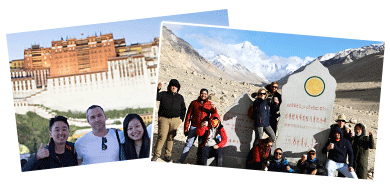
Make a Responsible Tibet Tour
Since mid-April, the best time to visit Tibet begins and will last to late October taking the weather into consideration. With the lifting of the restriction on nationality and group sizes (check for the details of Tibet permit policy), it is easy for travelers to get Tibet permit and travel to Tibet. But travelers are kindly required to make a responsible Tibet tour.
1. Don’t intrude on local people’s homes, tents, land or private activities (such as sky burials). Show respect for local’s private property and personal space. Always ask for permission before entering private property or land.

Tibetan people
2. Do not discuss political issues with Tibetans for you may put Tibetans in a politically difficult or even potential dangerous situation. Do not hand out photos of the Dalai Lama and politically sensitive materials.
3. Don’t break local laws and regulations: Remember that you are a guest in Tibet. Make sure you have the correct Tibet travel permits – your travel agency and tour guide or host could be fined or may even lose their license if you break the law.
4. Don’t be disrespectful at religious sites or family homes by wearing shorts or revealing clothing or kissing or touching intimately in public. Remove your hat and shoes unless instructed otherwise and don’t step over people or people’s legs – feet are considered dirty. Don’t relax by putting your feet up on tables or chairs.
5. Don’t swim in holy lakes, sit on holy objects such as mani stones or walk on or step over prayer flags.
Holy Lake in Tibet
6. Do not dole out medicine for it can encourage people not to seek proper medical advice and treatment, while handing out sweets or pens to children encourages begging. If you wish to contribute something constructive, it’s better to give pens directly to schools and medicines to rural clinics, or make a donation to an established charity.
7. Do not buy products made from endangered wildlife or endangered plants, such as snow leopards, Tibetan antelope.
8. Protect the environment when travelling in Tibet. Minimize your waste and dispose of waste appropriately. For instance, carry reusable cups, plates, cutlery or chopsticks. Try to purchase produce which is not wrapped in plastic. Avoid using disposable plastic shopping bags.
Most local villages don’t have environmentally sound trash management systems. Pack your garbage out to larger towns or cities when it can be disposed of appropriately. If there is no toilet, dig a hole at least 25cm deep and bury human waste. Burn or bury toilet paper.
9. Try and use as many Tibetan owned hotels, shops and restaurants as possible. This will also help to better the economy of Tibetan people.

The Lhasa-born prodigy used to study business overseas, and got his Bachelor of Business in Nepal and India before moving back to his homeland. With pure passion for life and unlimited love for Tibet, Kunga started his guide career as early as 1997.
Responsible, considerate, and humorous, he devoted his entire life to guiding and serving international tourists traveling in Tibet. As a legendary Tibetan travel guru with 20-year pro guide experience. Currently, he is working in Tibet Vista as the Tour Operating Director. Whenever our clients run into trouble, he is your first call and will offer prompt support.


.jpg)




0 Comment ON "Make a Responsible Tibet Tour"